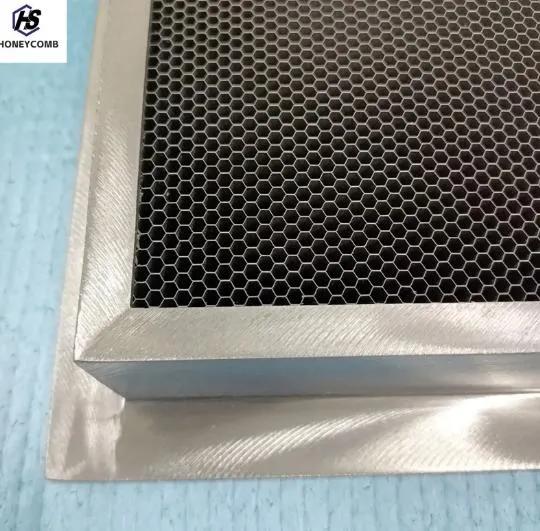
- Afrikaans
- Albanian
- Amharic
- Arabic
- Armenian
- Azerbaijani
- Basque
- Belarusian
- Bengali
- Bosnian
- Bulgarian
- Catalan
- Cebuano
- China
- China (Taiwan)
- Corsican
- Croatian
- Czech
- Danish
- Dutch
- English
- Esperanto
- Estonian
- Finnish
- French
- Frisian
- Galician
- Georgian
- German
- Greek
- Gujarati
- Haitian Creole
- hausa
- hawaiian
- Hebrew
- Hindi
- Miao
- Indonesian
- Italian
- Japanese
- Javanese
- Malay
- Persian
- Portuguese
- Punjabi
- Russian
- Spanish
- Swahili
- Telugu
- Vietnamese

Why Stainless Steel Honeycomb Panel is the Ultimate Choice for High-Tech Shielding and Protection
With rising demand for high-performance shielding materials, tấm tổ ong thép không gỉ has become the go-to solution for engineers and facility managers seeking superior structural integrity, advanced vibration control, and electromagnetic interference (EMI) protection.

The Role of Honeycomb Aperture in Stainless Steel Honeycomb Panel Shielding
A defining advantage of the tấm tổ ong thép không gỉ lies in its customizable honeycomb aperture size. The aperture, or the diameter of each cell, plays a critical role in determining its shielding effectiveness. When a smaller aperture is selected, especially in precision applications such as aerospace, laboratories, or telecom centers, the lưới tổ ong bằng thép không gỉ performs better at blocking high-frequency electromagnetic waves. Conversely, larger apertures favor applications where ventilation is equally important as shielding, such as HVAC filter systems or data center airflow walls.
The balance between the mechanical rigidity and the electromagnetic shielding offered by the tấm tổ ong thép không gỉ makes it ideal for scenarios that demand both structural and electronic performance. Unlike aluminum alternatives, stainless steel offers superior corrosion resistance and durability, making it suitable for more demanding environments.
Why Data Centers Depend on Stainless Steel Honeycomb Panel
Data centers face growing threats from both mechanical vibrations and EMI radiation. The tấm tổ ong thép không gỉ provides a reliable solution by serving dual functions: physical protection and EMI attenuation. Its cellular core diffuses waves and vibrations across a wide surface area, effectively minimizing equipment interference and ensuring signal clarity.
Compared with perforated panels or mesh-based systems, lưới tổ ong bằng thép không gỉ ensures a higher shielding efficiency due to its seamless design and denser cellular structure. In mission-critical IT infrastructures, even slight fluctuations in performance due to interference can lead to significant data errors. That’s why data centers across industries are increasingly integrating tấm tổ ong thép không gỉ configurations into server room walls, rack enclosures, and cooling systems.
Beyond shielding, the high airflow capacity of tấm tổ ong thép không gỉ contributes to better thermal management—an essential aspect of modern data environments. These panels promote a stable internal temperature, further protecting sensitive electronic components.
Anti-Vibration Benefits of Stainless Steel Honeycomb Sheet in Transportation and Aerospace
Another vital feature of the tấm tổ ong thép không gỉ is its anti-vibration and shock-resistance properties. Thanks to its hexagonal cell configuration, it can absorb and distribute kinetic energy efficiently. This makes the tấm tổ ong thép không gỉ an excellent fit for aircraft cabins, railway interiors, and high-speed vehicle panels, where weight must be kept low without compromising strength.
In applications where the panels are exposed to dynamic stress—such as during aircraft takeoff or road transportation—the lưới tổ ong bằng thép không gỉ works as a buffer layer, reducing vibration transfer to adjacent structures. Not only does this preserve the lifespan of surrounding components, but it also enhances the comfort and safety of passengers.
Because the tấm tổ ong thép không gỉ can be manufactured in various thicknesses and bonded with face sheets like stainless steel or aluminum, it offers extensive versatility in both functional and decorative installations.
Stainless Steel Honeycomb Panel vs. Traditional Shielding Materials
In terms of performance, the tấm tổ ong thép không gỉ surpasses most conventional shielding materials. It outperforms perforated aluminum panels in terms of mechanical strength, shielding performance, and longevity. Unlike fabrics or foils, lưới tổ ong bằng thép không gỉ doesn't degrade over time, even in high-temperature or humid environments.
Installation is another area where tấm tổ ong thép không gỉ shines. Its lightweight structure, despite its robust build, makes it easier to install in ceiling panels, enclosure doors, and even temporary shielding barriers. It’s also fire-resistant, non-combustible, and resistant to most chemicals—qualities that make it suitable for laboratories, clean rooms, and industrial facilities.
Cost-wise, while the tấm tổ ong thép không gỉ may carry a higher upfront investment than simpler materials, its long service life and minimal maintenance costs provide significant ROI in the long term. Plus, many industries now prioritize performance over initial cost, further driving the popularity of these advanced panels.
Stainless Steel Honeycomb Panel FAQs
What is the ideal honeycomb aperture size for EMI shielding?
For high-frequency EMI protection, a smaller honeycomb aperture (typically under 3 mm) is preferred. The denser structure of the tấm tổ ong thép không gỉ limits the passage of electromagnetic waves more effectively.
How does stainless steel compare to aluminum in honeycomb panels?
Stainless steel is more corrosion-resistant and provides better mechanical strength than aluminum. While aluminum is lighter, tấm tổ ong thép không gỉ is more durable and stable under extreme conditions.
Is the stainless steel honeycomb mesh customizable for shape and size?
Yes, most manufacturers offer customizable shapes, thicknesses, and even bonding options for lưới tổ ong bằng thép không gỉ, making it suitable for specific architectural or industrial requirements.
Can stainless steel honeycomb panel be used outdoors?
Absolutely. Thanks to its excellent weather and corrosion resistance, tấm tổ ong thép không gỉ performs well outdoors in various environmental conditions, including rain, snow, and salt air.
What industries benefit most from stainless steel honeycomb sheet?
Industries such as aerospace, telecommunications, data centers, defense, and transportation make the most use of tấm tổ ong thép không gỉ for shielding, structural support, and vibration control.
Danh mục sản phẩm
-
Why Vented Aluminum Honeycomb Is Leading the Way in Shielding and Ventilation SolutionsTin tứcJul.18,2025
-
Why Honeycomb Strips Are Revolutionizing High-Speed Sealing SolutionsTin tứcJul.18,2025
-
Shielded Glass Innovation Powers the Future of Electromagnetic ProtectionTin tứcJul.18,2025
-
Precision Starts Here: Revolutionizing Airflow Control with Honeycomb Wind Tunnel SolutionsTin tứcJul.18,2025
-
Elevate Industrial Performance with Precision-Engineered Steel Honeycomb Core SolutionsTin tứcJul.18,2025
-
Vented Aluminum Honeycomb: A Smart Shield for Airflow and EMI ControlTin tứcJul.11,2025
-
Steel Honeycomb Core: The Backbone of Structural ExcellenceTin tứcJul.11,2025















